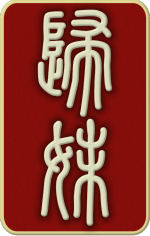
归妹 Guī mèi Union (Marrying) [hexagram 54]


Thunder over Lake
 Wood element
Wood element
Lunar month: 9 ; Host (controlling) line : 5
The Decision
Undertakings will be doomed and unfavorable.
The marriage of a young woman demonstrates the tension between heaven and earth. Heaven and earth must interact for everything to grow and flourish. The marriage of a young woman is both an end and a beginning. Pleasure and action come from the marriage of a young woman. ‘Undertakings will be doomed and unfavorable’ – the places are inappropriate and the weak are on top of the strong.
归妹: 征凶, 无攸利. Guī mèi: zhēng xiōng, wú yōu lì.
彖传: 归妹, 天地之大义也. 天地不交, 而万物不兴, 归妹人之终始也. 说以动, 所归妹也. 征凶, 位不当也. 无攸利, 柔乘刚也. Tuàn zhuàn: Guī mèi, tiān dì zhī dà yì yě. tiān dì bù jiāo, ér wàn wù bù xīng, guī mèi rén zhī zhōng shǐ yě. shuō yǐ dòng, suǒguī mèi yě. zhēng xiōng, wèi bù dàng yě. wú yōu lì, róu chéng gāng yě.
The Image
Thunder over the marsh forms marriage of a young woman. The wise contemplate the distant and eternal, understanding the perils of the short-lived.
象传: 泽上有雷, 归妹; 君子以永终知敝. Xiàng zhuàn: Zé shàng yǒu léi, guī mèi; jūn zǐ yǐ yǒng zhōng zhī bì.
Line Change 1
Young woman’s marriage as a concubine. Crippled in one leg yet still able to walk. Advance brings good fortune.
‘Young woman’s marriage as a concubine’ – this is a common practice. ‘Crippled in one leg yet still able to walk’ – fortunate as still able to help.
初九: 归妹以娣, 跛能履, 征吉. Chū jiǔ: guī mèi yǐ dì, bǒ néng lǚ, zhēng jí.
象传: 归妹以娣, 以恒也. 跛能履吉, 相承也. Xiàng zhuàn: Guī mèi yǐ dì, yǐ héng yě. bǒ néng lǚ jí, xiāng chéng yě.
Line Change 2
The one-eyed are still able to see. Favorable to remain steadfast and alone.
‘Favorable to remain steadfast and alone’ – the underlying principle is unchanged.
九二: 眇能视, 利幽人之贞. Jiǔ èr: miǎo néng shì, lì yōu rén zhī zhēn.
象传: 利幽人之贞, 未变常也. Xiàng zhuàn: Lì yōu rén zhī zhēn, wèi biàn cháng yě.
Line Change 3
Young woman’s marriage to someone inferior then returns to accept a junior role.
‘Young woman’s marriage to someone inferior’ – this is unsatisfactory.
六三: 归妹以须, 反归以娣. Liù sān: guī mèi yǐ xū, fǎn guī yǐ dì.
象传: 归妹以须, 未当也. Xiàng zhuàn: Guī mèi yǐ xū, wèi dāng yě.
Line Change 4
Young woman’s marriage is postponed. In due course it will take place.
‘Young woman’s marriage is postponed’ – the time is not yet appropriate.
九四: 归妹愆期, 迟归有时. Jiǔ sì: guī mèi qiān qī, chí guī yǒu shí.
象传: 愆期之志, 有待而行也. Xiàng zhuàn: Qiān qī zhī zhì, yǒu dài ér xíng yě.
Line Change 5
King Yi* gave his young sister in marriage but her gown was not as sumptuous as another sister who acted as a bridesmaid. The moon was approaching fullness. Good fortune.
*A ruler in the Shang dynasty.
‘King Yi gave his young sister in marriage but her gown was not as sumptuous as another sister who acted as a bridesmaid’ – her virtue rose above pettiness.
六五: 帝乙归妹, 其君之袂, 不如其娣之袂良, 月几望, 吉. Liù wǔ: dì yǐ guī mèi, qí jūn zhī mèi, bù rú qí dì zhī mèi liáng, yuè jī wàng, jí.
象传: 帝乙归妹, 不如其娣之袂良也. 其位在中, 以贵行也. Xiàng zhuàn: Dì yǐ guī mèi, bù rú qí dì zhī mèi liáng yě. qí wèi zài zhōng, yǐ guì xíng yě.
Line Change 6
The bride offers an empty basket, the groom sacrifices a lamb with no blood. This is not advantageous.
‘Empty basket’ – as there is nothing on top.
上六: 女承筐无实, 士刲羊无血, 无攸利. Shàng liù: nǚ chéng kuāng wú shí, shì kuī yáng wú xuè, wú yōu lì.
象传: 上六无实, 承虚筐也. Xiàng zhuàn: Shàng liù wú shí, chéng xū kuāng yě.
The full set of 64 English translations is available in our new book 'Book of Changes - Deciphered' ➚.